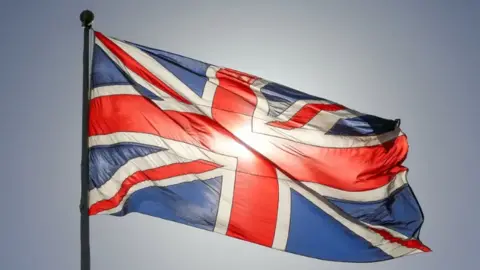On Queen Camilla’s birthday, a significant incident occurred in Londonderry when the union flag, displayed at a civil service building to commemorate the royal occasion, was stolen. This act was reported on July 17 and has since escalated into a serious investigation, as it has been characterized by authorities as a “sectarian hate crime.” The flag’s removal was not merely a theft but has raised alarms regarding the ongoing tensions between communities in Northern Ireland.
Reports indicate that in place of the union flag, an Irish tricolour was hoisted, an act that adds a layer of complexity to the incident, symbolizing deep-rooted divisions and political sentiments in the region. The Department for Communities confirmed they were aware of the flag’s “unauthorized” removal from its Lisahally office, reflecting on the environment of potential hostility that such actions can engender in a community still grappling with sectarian tensions.
The Police Service of Northern Ireland (PSNI) is treating this theft earnestly, underscoring the weight such actions carry in a society still healing from its tumultuous past. The PSNI has been actively seeking information regarding the theft, indicating that they consider the implications of this act seriously, especially in a community where symbols such as flags can evoke strong emotions.
Under local legislation, the union flag must be displayed at government buildings on designated days, and its presence on July 17 was sanctioned to honor the 78th birthday of Queen Camilla. While the Department has not explicitly acknowledged the replacement of the flag with the Irish tricolour, various accounts from individuals working nearby have substantiated this assertion, pointing to a provocative and confrontational atmosphere following the incident.
Lawmakers and local representatives have been vocal in their condemnation of the theft. Gary Middleton from the Democratic Unionist Party (DUP) described the act as “idiotic,” labeling it a “silly attention-seeking behavior” that disrespects community norms and sentiments. He insisted that the perpetrators should face legal consequences for their actions, highlighting the unacceptability of such provocations in a civil society.
Ulster Unionist councillor Darren Guy echoed these sentiments but expanded on the repercussions of such behavior, linking it to a pattern of sectarianism that has escalated in recent weeks. He noted various acts of vandalism and theft within the community, including the desecration of memorials and flags. His remarks illustrate a broader concern regarding the safety and integrity of community symbols that resonate deeply with local identities.
Criticism of the situation was directed at political counterparts from the Sinn Féin and the Social Democratic and Labour Party (SDLP), with Guy suggesting that their silence regarding similar incidents is tacit approval of sectarian attitudes. The issues discussed reflect a complex interplay between political identity, community relations, and the impact of sectarian history on contemporary society.
However, representatives from Sinn Féin countered this narrative by asserting their commitment to fostering respect for all cultures and denouncing any forms of hate crimes. They claimed to have consistently addressed issues of sectarianism and violence, emphasizing the necessity of engaging in dialogue to resolve grievances within the community.
Furthermore, Mark H. Durkan from the SDLP highlighted the damaging nature of such incidents on community relations, underscoring an urgent need for tolerance and unity. His call to halt any activities contributing to division reflects a shared desire among many community members to move past sectarian signs of conflict.
In summary, this incident is not merely about a flag being stolen; it represents ongoing sectarian issues that Northern Ireland continues to confront. Engagement from various political factions illustrates a fracture but also a desire for greater understanding and peace. The upcoming responses from the community and law enforcement will be pivotal in determining if a more united front can emerge from these divisive acts.











